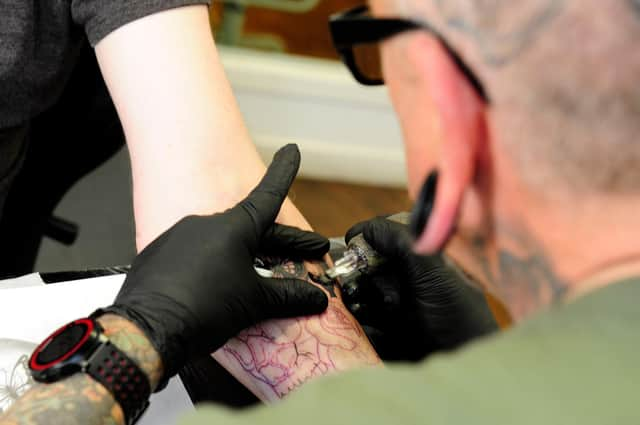Getting into the detail of discrimination law and body art - Simon Allison


My colleagues tell me that I am too old for ink, that I will regret it forever or that I am suffering from some kind of mid-life crisis. However, if it’s good enough for Beckham and Colman, it’s good enough for me.
What does the law say about tattoos? As an employment lawyer, I’m frequently asked whether workers who are treated differently because of their body art have any legal rights against their employers. Discrimination legislation protects workers against less favourable treatment because of sex, age, religion or belief and other protected characteristics. This protection does not however expressly include protection for workers with tattoos. Essentially workers with tattoos have no standalone protection under discrimination legislation.
Advertisement
Hide AdAdvertisement
Hide AdHaving said that, certain religions and philosophical beliefs may encourage tattoos. It is unlikely that Katy Perry, who has the word “Jesus” tattooed on her wrist, would be able to rely on discrimination legislation if she were treated less favourably because of her tattoo (I am not convinced that her tattoo is a manifestation of her religion or belief). On the other hand, a worker of Maori ethnicity, having facial tattoos of that culture, who was told by an employer to cover them up may have a claim for discrimination because of religion or belief.
Similarly, if reliable statistics were to demonstrate that there was a particular disadvantage to a particular age group within the workplace – for example, younger workers who were more likely to have tattoos and more likely to be reprimanded by their employer – a claim of indirect age discrimination could potentially be pursued. Depending on the circumstances of the workplace, there may however be a defence open to the employer for both of these types of claim.
Despite the potential risks outlined above, an employer is still entitled to set a dress code or appearance policy for all its employees – provided this is for a clear and justifiable reason. Reasons could include the nature of the business, the client-base or the feeling that it will detrimentally affect the organisation. An employer could legitimately create a policy which stipulated that employees should not have visible tattoos, particularly for employees who had customer/client-facing roles. An employer might also want to prohibit any offensive form of tattoo from the workplace and even make express reference to the acceptability (or otherwise) of piercings, hair styles and beards. The same caveats above would apply.
You’ve got to feel sorry for Lidl who, last year, lost a claim of unfair dismissal by an ex-employee, Mr Horvarth, who exposed his shoulder to a colleague and pointed to a swastika tattoo on his back. Mr Horvarth claimed that his swastika was a Buddhist peace symbol and was dismissed. At the employment tribunal hearing, Lidl were criticised for leaving “a great many questions unanswered” and the dismissal was deemed to have been unfair.
Ultimately an employer should take legal advice about the content of such a dress code policy before seeking to enforce it against its workforce. However, it would be equally as important to take legal advice about the implementation of such a policy, particularly to a workforce of existing staff.
And workers should ensure that they don’t make body ink decisions lightly. It is worth noting that Ariana Grande commissioned a tattoo which said “7 Rings” in Japanese, it transpires that the Japanese art translated as “Barbeque Grill”. But what will my parents say about my tattoo? With a fair degree of certainty, I am sure that my parents will not approve of my proposed ink. However, with an equal degree of certainty, I can assure you that I will not be telling them. And, if you happen to speak to them in the new few weeks, please keep it up your sleeve (… as will I).
Simon Allison is Head of Employment at Blackadders
@EmpLawyerSimon